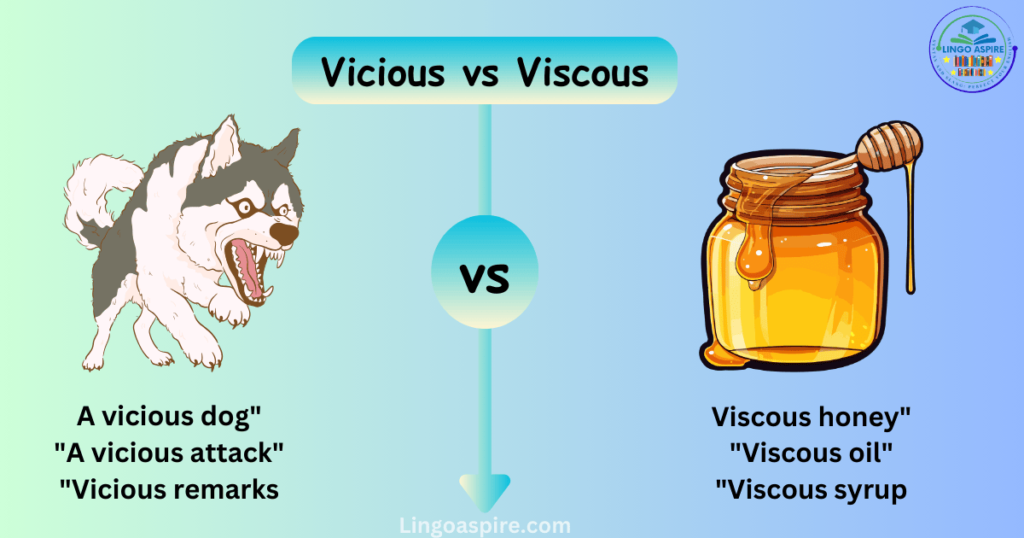Introduction: Clarifying Common Confusions: In the rich and varied tapestry of the English language, certain words present peculiar challenges. Words like vicious and viscous often trip up even the most careful speakers and writers due to their similar sound but starkly different meanings. Understanding the nuances between such words (vicious vs viscous) is more than an exercise in academic precision—it’s essential for clear and effective communication. Misusing these terms can lead not only to confusion but also to misinterpretations that may alter the intended meaning of a sentence drastically.
Vicious, associated with harmful and morally reprehensible behavior, and viscous, describing a physical property of fluids, are often confused. The mix-up usually stems from their phonetic similarity, yet their implications in speech and writing could not be more different. When vicious is mistakenly used in place of viscous, or vice versa, the error can lead to comical, if not completely perplexing, misunderstandings. It is therefore crucial to grasp these distinctions not only to enhance vocabulary but also to maintain the clarity and integrity of our communication. By mastering the correct usage of vicious and viscous, we ensure that our language accurately reflects our thoughts and intentions, supporting a clearer exchange of ideas and information.
Part 1: Decoding ‘Vicious’
Defining ‘Vicious’: Beyond Just Mean
The term vicious originates from the Latin “viciōsus,” which means “full of vice or moral faults.” Today, it refers to actions, behaviors, or dispositions that are dangerously aggressive, deliberately harmful, or intended to cause trouble. This word carries a strong negative connotation, often used to describe severe or harmful acts that are carried out with malice or a disregard for safety.
- Origin and Definition of ‘Vicious’:
| Term | Origin | Definition |
|---|---|---|
| Vicious | Latin “viciōsus” | Characterized by or resulting from severe cruelty, harm, or malicious intent. |
Psychological Impact of Using ‘Vicious’ in Language
Using the word vicious in language has a significant psychological impact. It intensifies the description of an action or behavior, suggesting a level of brutality or malevolence that demands attention. The term can influence how people perceive the actions described, possibly invoking fear or caution. It is powerful in shaping the tone of narratives or discussions, especially when discussing character traits, conflicts, or events.
‘Vicious’ in Action: Real-World Applications
Vicious is used across various platforms to communicate the severity and moral darkness of an action or character. It is particularly effective in media and literature for creating dramatic emphasis or in everyday conversations to express strong disapproval.
- Examples of ‘Vicious’ Usage:
| Context | Example |
|---|---|
| Media | “The debate turned vicious as each participant attacked the other’s integrity.” |
| Literature | “In the novel, the antagonist’s vicious nature is revealed through his schemes against the protagonist.” |
| Everyday Conversations | “That was a vicious rumor that should never have been spread.” |
Analysis of the Tone and Context Where ‘Vicious’ Is Appropriately Used
The appropriate use of vicious depends greatly on the tone and context. In journalism, it is used to describe particularly brutal crimes or attacks, emphasizing the severity and eliciting an emotional response from the audience.
literature, authors use vicious to develop dark or evil characters, enhancing the narrative tension and deepening the plot. In everyday language, calling an act or comment vicious implies a strong condemnation of that behavior, suggesting it was not just harmful, but cruelly intentional.
All cases, the choice of this word adds a layer of seriousness and intensity, signaling that the discussed behavior is not only negative but also reprehensibly so. This makes vicious a powerful word in any writer’s or speaker’s arsenal, used to convey clear, strong, and often warning messages about the nature of the actions or events described.
Part 2: Understanding ‘Viscous’
What Does ‘Viscous’ Really Mean?
The term viscous is derived from the Latin “viscum,” which refers to a sticky substance derived from mistletoe berries. In a scientific context, viscous describes a fluid’s resistance to flow—the greater the viscosity, the slower the fluid moves. This property is crucial in both natural phenomena and various technological applications.
- Definition and Physical Properties:
| Term | Origin | Definition |
|---|---|---|
| Viscous | Latin “viscum” | Describes a fluid that is thick and sticky, with a high resistance to flow due to internal friction |
Simple Scientific Explanation of Viscosity
Viscosity is a measure of a fluid’s resistance to deform under shear stress or tensile stress. It is essentially the “thickness” or internal friction of the fluid. For example, honey has a higher viscosity than water because it flows more slowly, indicating greater internal friction among its molecules. Viscosity is a critical factor in everything from biological systems to mechanical and industrial processes because it influences how substances behave under different conditions.
‘Viscous’ at Work: Practical Examples
Understanding the concept of viscosity is crucial across multiple fields. It can influence product design, manufacturing processes, and even environmental management.
- Applications of Viscosity:
| Field | Substance | Application |
|---|---|---|
| Culinary | Syrup | The viscosity of syrup affects its pouring behavior and coating ability in recipes. |
| Engineering | Lubricants | Viscosity is key to ensuring that lubricants properly protect machinery by creating a sufficient film to reduce wear. |
| Nature | Lava | The flow of lava during volcanic eruptions is a study in natural viscosity, affecting how far and fast it travels. |
How Understanding ‘Viscous’ Helps in Different Fields
In the culinary world, chefs must understand the viscosity of liquids to achieve desired textures and consistencies in dishes. For example, the success of a sauce can depend on its ability to coat food effectively without being too runny or too thick.
In engineering, understanding the viscosity of materials like lubricants or polymers is crucial for designing machines and structures that operate efficiently under varying stress and temperatures. For instance, the right viscosity of oil in an engine ensures it can run smoothly by reducing friction between moving parts.
In environmental science, the study of viscosity is important when dealing with natural phenomena such as lava flows or mudslides, as well as in designing systems to handle waste materials like sludge and sewage.
The practical understanding of viscosity and the ability to control or predict the behavior of viscous materials are therefore vital skills in many scientific and technical fields, underlining the importance of mastering this concept for a wide range of professional and academic endeavors.
Part 3: Contrasting and Comparing

‘Vicious’ vs ‘Viscous’: A Clear Contrast
Understanding the differences between vicious vs viscous is crucial for using these terms correctly. While they sound similar, their meanings and uses are distinctly different, pertaining to unrelated concepts.
- Side-by-Side Comparison:
| Term | Definition | Usage Context |
|---|---|---|
| Vicious | Involving or characterized by violence, danger, or ferocity. | Often used in social, psychological, and moral contexts to describe behavior or actions. |
| Viscous | Having a thick, sticky consistency between solid and liquid; resistance to flow. | Primarily used in scientific and technical contexts to describe physical properties of fluids. |
This table highlights how vicious relates to negative behavior or actions, often with a moral undertone, whereas viscous refers to a physical property of materials, particularly fluids.
Memory Aids: Tricks to Remember the Difference
To help distinguish vicious from viscous, mnemonic devices can be incredibly helpful. They simplify the process of recalling which word to use in various contexts.
- Mnemonic for ‘Vicious’:
- Think of a snake hissing — a sound similar to “vicious,” which also conveys danger and threat, encapsulating the word’s connotation of harm and aggression.
- Mnemonic for ‘Viscous’:
- Visualize a bottle of glue slowly oozing out its contents. The slow movement of the glue, similar to the word viscous, captures the essence of its meaning — thick and slow-moving.
Tips on How to Avoid Common Mistakes
One of the simplest ways to avoid mixing up vicious vs viscous is to associate each word with its specific context immediately when you hear or think about it:
- When you think of vicious, immediately picture an aggressive animal or a harsh action, which helps cement its association with behavior.
- For viscous, imagine pouring syrup or honey — their slow, thick flow reinforces the scientific nature of viscosity.
By using these mnemonic devices and tips, you can ensure that you remember the distinct meanings and appropriate contexts for vicious and viscous, reducing the likelihood of confusion and improving your precision in language use.
Part 4: Expanding Your Understanding
Synonyms and Antonyms: Enriching Vocabulary
Expanding your vocabulary with synonyms and antonyms not only enhances your linguistic capabilities but also provides you with alternative ways to express the same idea, allowing for more precise and varied communication. Here is a table of synonyms and antonyms for both vicious vs viscous to help deepen your understanding of each word.
- Synonyms and Antonyms Table:
| Word | Synonyms | Antonyms |
|---|---|---|
| Vicious | brutal, cruel, malicious, malevolent, barbaric, ferocious, ruthless, vindictive, spiteful | benign, gentle, kind |
| Viscous | sticky, gelatinous, glutinous, syrupy, thick, gooey, adhesive, mucilaginous, treacly, slimy | runny, watery, fluid |
How These Related Words Can Be Used Effectively in Various Contexts
Understanding the synonyms and antonyms of vicious and viscous allows you to select the most appropriate word based on the context and desired impact. For instance, in a scientific report discussing the properties of a new lubricant, using terms like ‘gelatinous’ or ‘mucilaginous’ might be more precise than simply saying ‘viscous’. Conversely, describing a particularly harsh winter as ‘cruel’ or ‘ruthless’ can convey the severe impact it has on people, which ‘vicious’ might not fully capture.
Historical Journey: The Evolution of ‘Vicious’ and ‘Viscous’
Both vicious and viscous have evolved significantly in their usage over time, reflecting changes in language and shifts in cultural and technological contexts.
- Timeline of ‘Vicious’:
- 14th Century: Derived from the Old French vicios, meaning full of vice.
- 17th Century: Became associated with morally depraved or corrupt behavior.
- Modern Day: Commonly used to describe anything from severe weather to malicious intent.
- Timeline of ‘Viscous’:
- Late 14th Century: Introduced into English from the Latin viscosus, referring to a sticky quality.
- 19th Century: Gained prominence in scientific fields, especially in physics and engineering.
- Today: Regularly used in discussions ranging from cooking to polymer science.
Conclusion: Mastering Usage for Clarity and Impact
Recapping the main points, vicious vs viscous are two terms that, while phonetically similar, have completely different meanings and uses. Understanding and using these words correctly enhances the clarity and effectiveness of your communication. By mastering their usage, you can ensure that your language precisely conveys your intended message.
Interactive Element: Test Your Knowledge
To solidify your understanding, consider this short quiz:
- Define vicious and viscous in your own words.
- Use both words in a sentence that illustrates their correct context.
- Identify which synonym could replace viscous in a scientific report discussing fluid dynamics.
Further Reading and Resources
For those looking to deepen their knowledge of English vocabulary and its nuances, numerous resources are available:
- Merriam-Webster for detailed definitions and etymologies.
- Oxford English Dictionary for historical usages and developments.
- Cambridge Dictionary for usage examples and synonyms.
By exploring these resources, you can continue to expand your vocabulary and enhance your ability to communicate effectively and precisely.







